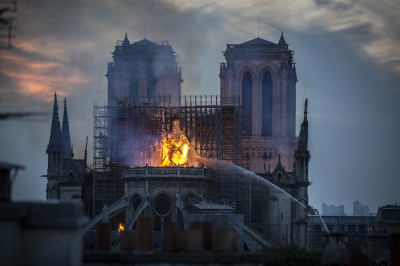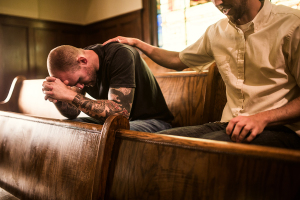'Judeo-Christian' definition has changed: A response to Johnnie Moore, Rabbi Adlerstein

In their attack on me (“People Should Actually Understand ‘Judeo-Christian’ Before They Appropriate It,” May 30, 2019), Rabbi Yitchok Adlerstein and Rev. Johnnie Moore could have actually read my piece in The New Republic before deciding it was worthy of their derision. And then they border on the ridiculous when they go so far as to suggest I sympathize with antisemites in the Middle East. My piece had nothing to do with the Middle East or antisemitism. I expected so much more from Rabbi Adlerstein, who defended reason in the Bible code controversy, and Rev. Johnnie Moore, who has done great work raising awareness for humanitarian crises around the world.
I’m a historian, not an ideologue. My fealty is to the past. My article was about how the phrase “Judeo-Christian” has been defined over time. And guess what? Its meaning changed over time (like almost every other word in the English language). At one point, “Judeo-Christian” was used by religious people on the left who tried to end violent antisemitism, anti-Catholicism, and Nazism. Since the 1970s, the right has made the term their own, seeing secularism and Islam as true enemies. Even more recently, conservatives have tried to mobilize the term in order to paper over the violent outbursts of the alt-right.
These are historical facts. My article stemmed from my frustration that American conservatives were using the fire at Notre Dame in order to mobilize their troops, saying the Catholic cathedral in Paris was part of the “Judeo-Christian tradition” and needed to be honored as such (historical facts: it is a Catholic cathedral and Jews were expelled from France shortly after it was completed, so calling it “Judeo-Christian” is historically inaccurate).
But historical facts are irrelevant to people trying to fashion some sort of tradition in order to unify themselves into a coherent whole, people like Rabbi Adlerstein and Rev. Moore. People like them get mad at historians who disrupt their invented narrative. But a close look at their weak-kneed arguments allows us to see their true motives. Let’s focus on their fundamental claim that the “Judeo-Christian tradition” has a fixed meaning.
If so, what is it? Well, to them it’s a feeling, something “sensed,” something that has an “essence.” Great. I’ve been a historian for a long time and detecting what people “sensed” is impossible to pin down. But that doesn’t stop our intrepid authors! It existed in the past, they swear, they can feel it!
Helpfully, they offer something of a definition. They argue that both Jews and Christians believe in an omnipotent, omniscient, benevolent God who humans can begin to relate to through some, non-specified version of the Bible. Oh, and God believes in the family and that absolutes exist.
That’s very vague, clearly an attempt to ignore the many, many questions it raises, such as: Why, then, aren’t Muslims included? Their belief ticks all those boxes. Concerning Jews and Christians, though, which parts of “the Bible” are the important ones? What even is “the Bible”? Do Jews believe in the New Testament? Do Jews now believe in Heaven? Can they get there without believing the divinity of Christ? And what about Catholics? They have their own Bible. Does it count as “the Bible”? And what about the priesthood?
Looking at it from another perspective, did those who Rabbi Adlerstein and Rev. Moore say felt the “much older” “essence” of the “Judeo-Christian tradition” simply ignore it when they practiced pogroms, proselytization, and other manifestations of Christian antisemitism, events Rabbi Adlerstein knows well from his work at the Simon Wiesenthal Center? Did those older folks simply miss the collective tradition, too, just like me? Or were they aware that no such tradition actually existed?
So we should see Rabbi Adlerstein and Rev. Moore’s “statement” for what it is: an attempt to unify evangelical Protestants and Orthodox Jews in the face of what they see as their real enemy today, secularism and militant Islam. Why else would they label me (whom they clearly know nothing about) an antisemitic Muslim or a secularist out to destroy all faith? Ironically, they fit nicely into the various meanings I mapped out in my article.
I’m a historian whose books have detailed the many contributions of religious people in modern America. If Rabbi Adlerstein and Rev. Moore want to “imagine Schultz writing with the same passion to remember the great contributions of traditional religious communities in history,” all they have to do is walk to their local library and look at my books.
And if they do that, if they seriously want to learn from the past rather than use it for their own gain, I’d recommend they stick to the work of bona fide historians and not ideological grifters like Ben Shapiro, people who have made a living stirring up discord for their own personal gain. We as a nation are all more divided and polarized for it. Rabbi Adlerstein and Rev. Moore should have known better.
Kevin M. Schultz is Professor of History and Religious Studies at the University of Illinois at Chicago. Among his books are Tri-Faith America: How Catholics and Jews Held Postwar America to its Protestant Promise and Buckley and Mailer: The Difficult Friendship That Shaped The Sixties.



























